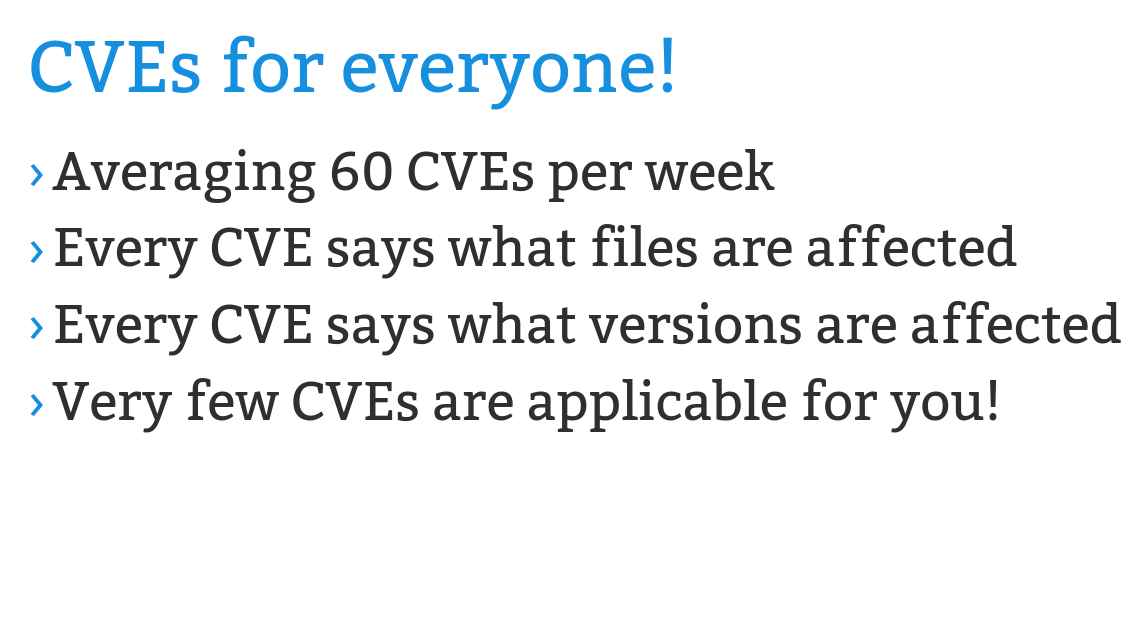Thorsten Leemhuis (acct. 1/4)
kernellogger@fosstodon.orgI'd really like to read a well researched article that sums up how Linux distros reacted to the massive influx of #Linux #kernel CVE that started ~half a year – both for their #LinuxKernel packages and their live-patching offerings.
But I guess that is an enormous amount of work that no media outlet in this world is willing to pay anyone for writing. 😕
Slide taken from @gregkh's "Why are there so many kernel CVEs?" talk he gave at OSS China yesterday (https://social.kernel.org/objects/c9979d9f-399f-428b-ac56-c41598076dfa ) #LinuxKernel
Stephen Greenham
solarisfire@mast.solarisfire.com@kernellogger
Do most distros care? Don't they just rely on the kernel development community to fix security holes and then just pull and release the latest kernels when they become available? I guess bigger companies like Red Hat would want to get involved themselves and push CVE fixes upstream, but I'm sure many distros wouldn't do a thing?
@gregkh
Thorsten Leemhuis (acct. 1/4)
kernellogger@fosstodon.org"Don't they just rely on the kernel development community to fix security holes and then just pull and release the latest kernels when they become available": some do, but some (many?) do not; among them are Ubuntu and its derivatives, which quite a few times even managed to ship kernels with new releases that were EOL already -- and then also remained on it for months or years…
And for live patching it's not a simple "pull in the changes" at all…
Stephen Greenham
solarisfire@mast.solarisfire.com@kernellogger @gregkh I think the number of distros that do modify the kernel in some way is relatively small (Although it's usually distros with a larger install base that do).
Sure RHEL, Ubuntu, SUSE, Fedora, and Clear Linux are known for applying their own patches to the Linux kernel or running custom kernels. But a lot of this is backported code from future kernels into older ones, and anything new they develop usually gets pushed upstream.
Live patching is a dark art...
Pavel Machek
pavelschrotthaufen
schrotthaufen@mastodon.social@pavel @kernellogger Yeah. The “every bug in the kernel is a security issue, because it affects (at the very least) availability” puts a huge burden on everyone downstream of the kernel team. According to Spender (of grsec), most of these automated CVEs can’t even be triggered, let alone exploited, and some actually exploitable bugs are missed by the automated CVE assignment.
Imho it’s active sabotage of the already not great CVE system.
Thorsten Leemhuis (acct. 1/4)
kernellogger@fosstodon.orgGreg K-H
gregkhYes, once we agree "this commit should get a CVE" we have tools to make the assignment and publish the notice in an automated way, but all CNAs have something like that (if they don't they are wasting a lot of time doing it by hand.)
schrotthaufen
schrotthaufen@mastodon.social> CVE assignment is ANYTHING but automatic.
Guess I misremembered the methodology you outlined some time ago, then. Thanks for clearing that up.
Pavel Machek
pavelPavel Machek
pavelArjan van de Ven
fenruspdx@fosstodon.org@solarisfire @kernellogger @gregkh Eh Clear Linux barely patches the kernel (we patch some defaults etc and backport a few things from -next at times.. but very very light).. instead Clear Linux stays on current stable kernels very aggressive, while we provide the current last-two-LTS-kernels as well as an option. We update almost always within a day of the stable team releasing ... and we can do that because we barely patch things.
Stephen Greenham
solarisfire@mast.solarisfire.com@fenruspdx @kernellogger @gregkh Oh cool, guess I got my wires crossed. I personally really like the aggressive approach to sticking close the the stable kernel 🙂
Klara ❤️
boo_@im-in.space@pavel @kernellogger @schrotthaufen @gregkh I don't get how that's misleading. He didn't say anything to the contrary.
Thorsten Leemhuis (acct. 1/4)
kernellogger@fosstodon.org@solarisfire @fenruspdx @gregkh
FWIW, Fedora is also pretty close to latest stable and does not patch much (but a bit more that Arch Linux)
But I'm pretty sure your "the number of distros that do modify the kernel in some way is relatively small" claim is wrong. Debian, openSUSE Tumbleweed are also pretty close and do not patch that much, but for most others it's different.
Stephen Greenham
solarisfire@mast.solarisfire.com@kernellogger @fenruspdx @gregkh I don't see how smaller distros have the resources to do CVE fixes or modifications to the kernel, when they can just use mainline and put development effort into other parts of the OS.
Sure distros like CachyOS replace schedulers and do performance tweaks, but they're not working on kernel CVEs alone surely?
A lot of the more security focused distros just sit on the LTS kernel.
Qubes OS is interesting in what it does with the Kernel.
Moritz Mühlenhoff
jmm@fosstodon.org@kernellogger @gregkh For Debian the new process has been really helpful and made our lifes simpler. Previously we had to collect the CVE references from various sources (MITRE CVE feed, cross checks with RH Bugzilla, oss-sec etc) and now we simply parse all the data from the cve-linux-announce feed.
The only thing that changed for users is that we no longer issue advisories with CVE summaries (like https://lists.debian.org/debian-security-announce/2023/msg00013.html), but now only list the CVE IDs. That would be too time-consuming...

